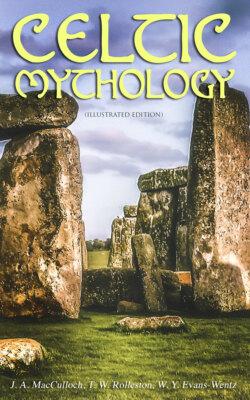Читать книгу CELTIC MYTHOLOGY (Illustrated Edition) - T. W. Rolleston - Страница 15
На сайте Литреса книга снята с продажи.
Cæsar's Account
ОглавлениеCæsar has given us a careful and critical account of them as he knew them in Gaul. They were, he says, eager for battle, but easily dashed by reverses. They were extremely superstitious, submitting to their Druids in all public and private affairs, and regarding it as the worst of punishments to be excommunicated and forbidden to approach thu ceremonies of religion:
“They who are thus interdicted (for refusing to obey a Druidical sentence) are reckoned in the number of the vile and wicked; all persons avoid and fly their company and discourse, lest they should receive any infection by contagion; they are not permitted to commence a suit; neither is any post entrusted to them.... The Druids are generally freed from military service, nor do they pay taxes with the rest.... Encouraged by such rewards, many of their own accord come to their schools, and are sent by their friends and relations. They are said there to get by heart a great number of verses; some continue twenty years in their education; neither is it held lawful to commit these things (the Druidic doctrines) to writing, though in almost all public transactions and private accounts they use the Greek characters.”
The Gauls were eager for news, besieging merchants and travellers for gossip,16 easily influenced, sanguine, credulous, fond of change, and wavering in their counsels. They were at the same time remarkably acute and intelligent, very quick to seize upon and to imitate any contrivance they found useful. Their ingenuity in baffling the novel siege apparatus of the Roman armies is specially noticed by Cæsar. Of their courage he speaks with great respect, attributing their scorn of death, in some degree at least, to their firm faith in the immortality of the soul.17 A people who in earlier days had again and again annihilated Roman armies, had sacked Rome, and who had more than once placed Cæsar himself in positions of the utmost anxiety and peril, were evidently no weaklings, whatever their religious beliefs or practices. Cæsar is not given to sentimental admiration of his foes, but one episode at the siege of Avaricum moves him to immortalise the valour of the defence. A wooden structure or agger had been raised by the Romans to overtop the walls, which had proved impregnable to the assaults of the battering-ram. The Gauls contrived to set this on fire. It was of the utmost moment to prevent the besiegers from extinguishing the flames, and a Gaul mounted a portion of the wall above the agger, throwing down upon it balls of tallow and pitch, which were handed up to him from within. He was soon struck down by a missile from a Roman catapult. Immediately another stepped over him as he lay, and continued his comrade's task. He too fell, but a third instantly took his place, and a fourth; nor was this post ever deserted until the legionaries at last extinguished the flames and forced the defenders back into the town, which was finally captured on the following day.
